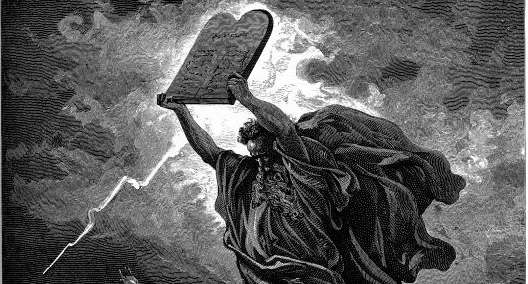Set in Stone
It’s commonly said that although the Bible is “God’s word”, God didn’t actually (phyiscally) write any of the Bible himself. Which is largely true. We see the authorship of the Bible they way the apostle Peter saw the writing of prophecy: “prophecy never had its origin in the human will, but prophets, though human, spoke from God as they were carried along by the Holy Spirit.” (2 Peter 1:21)
But two places do describe God’s writing. In Exodus 31:8, 16, God gives Moses “[two] tablets of stone inscribed by the finger of God. … The tablets were the work of God; the writing was the writing of God, engraved on the tablets.”
The second were a replacement set:
The Lord said to Moses, “Chisel out two stone tablets like the first ones, and I will write on them the words that were on the first tablets, which you broke.” (Exodus 34:1)
This has a somewhat comical feel to it, and perhaps God was gently chiding Moses at this point. When Moses came down Mount Sinai with the original tablets, he saw the Israelites worshipping a Golden Calf they had commissioned from his brother, Aaron.
When Moses approached the camp and saw the calf and the dancing, his anger burned and he threw the tablets out of his hands, breaking them to pieces at the foot of the mountain. And he took the calf the people had made and burned it in the fire; then he ground it to powder, scattered it on the water and made the Israelites drink it. (Exodus 33:19-20)
Despite the apparent rich-person fashion for gold-encrusted steak, one assumes this would not have been a pleasant experience for the Israelites.
The commandments themselves would, of course, endure. The New Testament writers endorsed all but one of the commandments. The exception is the Sabbath. Instead, Jesus would say of it:
“The Sabbath was made for man, not man for the Sabbath. So the Son of Man is Lord even of the Sabbath.” (Mark 2:27-28)
And for the Sabbath rest, he would point instead to himself:
“Come to me, all you who are weary and burdened, and I will give you rest.” (Matthew 11:28)
